 Headline News
Headline News
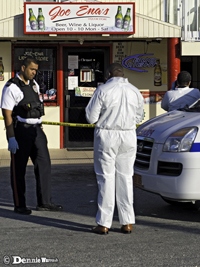
Armed robbery in West Bay
 (CNS): The RCIPS has confirmed that Joe-Enas Liquor store, West Church Street, in West Bay was robbed by a single armed gunman this afternoon (Thursday 27 January). Police say that sometime around 3:35pm to 3:40pm a man armed with what appeared to be a handgun entered the store and pointed the gun at a female member of staff and demanded cash. He then pointed the gun towards the ceiling and she heard a loud bang. The suspect grabbed the cash pan and ran off from the store. He was last seen entering Gunter Link where it is believed he entered a vehicle and made off. The suspect is described as being approximately 6’3” in height, slim build, wearing a long sleeved dark sweat top and dark jean pants. (Photo by Dennie Warren Jr)
(CNS): The RCIPS has confirmed that Joe-Enas Liquor store, West Church Street, in West Bay was robbed by a single armed gunman this afternoon (Thursday 27 January). Police say that sometime around 3:35pm to 3:40pm a man armed with what appeared to be a handgun entered the store and pointed the gun at a female member of staff and demanded cash. He then pointed the gun towards the ceiling and she heard a loud bang. The suspect grabbed the cash pan and ran off from the store. He was last seen entering Gunter Link where it is believed he entered a vehicle and made off. The suspect is described as being approximately 6’3” in height, slim build, wearing a long sleeved dark sweat top and dark jean pants. (Photo by Dennie Warren Jr)
He had what appeared to be a white shirt/cloth covering his head and face. The woman was not injured in the incident.
West Bay detectives and Scenes of Crime officers are currently at the scene. It cannot be confirmed at this time whether a shot was discharged as forensic examination is currently ongoing.
Anyone who was in the area at the time of the robbery who saw the man enter the store or run off after the incident is asked to contact West Bay CID. Officers would also be keen to speak to anyone who saw a car drive off at speed from the area.
Information can be passed to West Bay police station 949-3999 or the confidential Crime Stoppers number 800-8477 (TIPS).
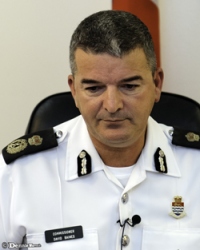
RCIPS tackles drugs & gangs
 (CNS): There are indications that the Cayman Islands is being used as a hub for significant quantities of cocaine trafficking, Police Commissioner David Baines said at an RCIPS press briefing Wednesday. Recently there were two significant seizures in the UK of cocaine from flights from Cayman – one of 6 kilos and one of 10 kilos – within a 2 week period and around the same time 44 kilos of cocaine washed up on a beach in the Cayman Islands. He said it was apparent that there were increasing levels of cocaine distributed on island and the purity of cocaine recovered here was “about as pure as you can get”, unlike in UK where it has been considerably doctored down. This suggested that it was “straight from the production side,” Baines said. (Photo by Dennie Warren Jr)
(CNS): There are indications that the Cayman Islands is being used as a hub for significant quantities of cocaine trafficking, Police Commissioner David Baines said at an RCIPS press briefing Wednesday. Recently there were two significant seizures in the UK of cocaine from flights from Cayman – one of 6 kilos and one of 10 kilos – within a 2 week period and around the same time 44 kilos of cocaine washed up on a beach in the Cayman Islands. He said it was apparent that there were increasing levels of cocaine distributed on island and the purity of cocaine recovered here was “about as pure as you can get”, unlike in UK where it has been considerably doctored down. This suggested that it was “straight from the production side,” Baines said. (Photo by Dennie Warren Jr)
The fact that it was discovered on these flights indicated that Cayman is part of the transshipment of the drug. However,there were also signs that it is being distributed locally. In the UK they found that the advent of the use of cocaine by users corresponded to the advent of street robberies as the need for quick money resulted in increasingly bold crime. Baines said the RCIPS was seeing some of that here. With a threat of violence or actual violence in the majority of robberies last year that was "wholly disproportionate to the spoils", Bains asked why the perpetrators would risk ten year’s imprisonment for firearms crime for relatively small amounts of money, and suggested it was a sign of illicit drug users.
Chief Superintendent John Jones noted that nasty violent crimes were symptomatic of crack cocaine users, a theory supported by seizures of crack.
In enforcement of boarder control it is important to work with partners across region, such as Honduras, Jamaica and US, to stop drugs and the firearms that often comes with them coming into the islands, Baines said. Asked what the RCIPS needs in terms of equipment and resources, the commissioner said it was a question that should be looked at on a regional basis; there was a need to operate in the Caribbean as a region and coordinate endeavours. There is little point, for example, in having radar capacity that doesn’t link into with Jamaica or Honduras, he pointed out.
The US recognizes the threat, not least because their efforts to stem the drugs coming across the Mexican border will increase the threat of drugs coming through the Caribbean, the commissioner said, noting that US President Obama, under the Caribbean Basin Security Initiative, promised $42million to that end last year and up to $70million this year.
“That’s about giving us some capability to fill the intelligence and information gap to make the best use of the resources you’ve got,” he said. The helicopter can go out 60 miles off the coast at times and conditions when traditionally we’ve experience vessels coming to us, he said, but if it’s covering the area from Jamaica, it’s not covering the area from Honduras. He also said the RCIPS vessels were “fit for purpose” but the issue was how to make sure they were in the right place at the right time – which comes down to intelligence and information to identify suspect vessels and see where they are.
He said this was why looking collectively at the provision of wider radar coverage in the Caribbean was important.
Baines said he was pretty certain that some of the robberies on Grand Cayman were gang initiation ceremonies, to prove they had what it takes to act in criminal manner, and the crimes provided immediate funds for drugs and alcohol for gang members. This was one possible explanation why small amounts cash were targeted from vulnerable places, such as pizza parlours and corner shops.
Last year Baines had said there was a small group of men who were mostly responsible for the island’s murders. On Wednesday he said that fourteen men were now in custody, some primary gunmen and many that people in the community knew were involved. Other individuals were dead, the victims other gang members. He said there were a few gunmen still in the community and 2 individuals had left the jurisdiction.
“We stand at a crossroads,” Baines said, when asked about a possible new wave of recruits into gangs. “We are not going to arrest and convict our way out of a pool of individuals who have no stake in society, who would rather be part of a gang and have some status or respect within that gang, and some will always step in to be the head or the most violent in that gang.” The challenge for the RCIPS was to arrest them as quickly as possible, he said.
“Regrettably, there aregang members across the island, maybe not wanting to shoot and kill each other, but they engage in criminality at whatever level,” he said. “There will always be those people at the far edge who will bethe enforcers or the violent or the gunmen in those gangs. They are our priority because they are the most dangerous. Equally, there is a pool out there willing to be soldiers to step into vacancies we created.”
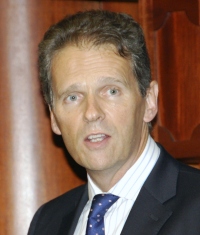
Accounts down to Cabinet
 (CNS): The country’s governor says he believes that his office does not have the ultimate responsibility for the problems surrounding the breakdown of the public accounts system but that the responsibility is held collectively by Cabinet. Speaking to CNS recently, Governor Duncan Taylor said it was essential that the accounts were properly addressed and that the system was changed. Although he said he did not believe that the country’s accounting system could go back in time, it would need to change in order to move forward and provide the public with transparent and accurate accounts. “The nettle needs to be grasped,” Taylor said.
(CNS): The country’s governor says he believes that his office does not have the ultimate responsibility for the problems surrounding the breakdown of the public accounts system but that the responsibility is held collectively by Cabinet. Speaking to CNS recently, Governor Duncan Taylor said it was essential that the accounts were properly addressed and that the system was changed. Although he said he did not believe that the country’s accounting system could go back in time, it would need to change in order to move forward and provide the public with transparent and accurate accounts. “The nettle needs to be grasped,” Taylor said.
He said he had spent considerable time in discussions with the auditor general and that he agreed with Alastair Swarbrick that the issue was certainly one of leadership. The governor said that the goal now was to catch up as quickly as possible and then change the system and address some of the complexities inherent with it. He said government had to be held accountable by the people for the money it spent.
Although he would not be drawn on exactly where the buck stopped, he said he did not believe it was down to the governor’s office. He said, however, the management of the system was the collective responsibility of all members of the Cabinet.
Above all, the governor said, the problem was a change management issue and that the law needed to be simplified. While it may take some years to to turn the system around, the governor said it was important that government was held accountable.
On a more positive note regarding government finances, he said the savings made in the budget had gone a long way to reducing the anticipated deficit and that the FCO was satisfied the CIG was committed to addressing public spending.
He acknowledged the reviews of the civil service were taking longer than had been originally anticipated, but he said they were much more in depth than had been expected and had revealed considerable potential future savings. Following the completion of reports on the first four departments, which were recently made public, the next phase, which is a review of another eight agencies, is almost complete, Taylor said. However, the civil service management was trying not to lay people off and make the staff cuts through natural attrition. “Where there isn’t a benefit system it is difficult to make people redundant,” Taylor added.
With lingering economic concerns for the year ahead, the governor said it was important that government remained on track to keep government finances under control. Taylor said the next three months, when government took in a considerable amount of income, would be crucial, especially as government was still facing unfunded liabilities.
“The pressure will not ease on government finances until it has created a sink fund,” the governor added.

Prosecutor to cost $2.8m
 (CNS): The deputy governor says that the country will have a director of public prosecutions that will be charged with handling the criminal cases in the country’s courts before the end of 2011. The new office, which will be formed from part of the current legal department, will cost around $2.8m per year and have the responsibility of prosecuting solely criminal cases on behalf of the crown. The drafting of the country’s legislation, legal advice to government and civil work will all remain with the Attorney General’s Chambers. The new post, established under the 2009 Cayman Islands Constitution, is expected to be advertised in the next few months, Donovan Ebanks revealed in the Legislative Assembly earlier this month.
(CNS): The deputy governor says that the country will have a director of public prosecutions that will be charged with handling the criminal cases in the country’s courts before the end of 2011. The new office, which will be formed from part of the current legal department, will cost around $2.8m per year and have the responsibility of prosecuting solely criminal cases on behalf of the crown. The drafting of the country’s legislation, legal advice to government and civil work will all remain with the Attorney General’s Chambers. The new post, established under the 2009 Cayman Islands Constitution, is expected to be advertised in the next few months, Donovan Ebanks revealed in the Legislative Assembly earlier this month.
Responding to an opposition parliamentary question from Alden Mclaughlin, Ebanks said a job description had been developed for the DPP and, “subject to funding”, the new top legal position would be advertised during the next few months.
The deputy governor revealed that the job has been assessed at grade D and will pay a salary of up to $125,000. As the person is not likely to be officially appointed until the later part of 2011, he said, the job would not impact this current fiscal year’s budget. The new Judicial and Legal Services Commission will be advising the governor on the post, and that body has now drafted a law to underpin its operations.
In the 2011/12 strategic policy statement it was revealed that the new office will cost around $2.8million, which will be made up of the $2.6m currently allocated to the legal department for prosecution services along with another quarter of a million for the DPP’s salary and extra staff, such as a secretary, and the cost of opening the office.
Ebanks said it was not yet clear exactly how the staff from the existing department would be divided but it was expected that many of the public sector lawyers currently working on criminal cases on behalf of legal services would now move to the new independent office. Currently, it is the solicitor general that heads up the prosecution of criminal cases but that role is normally a more civil role, and so is likely to stay within the Attorney General’s Chambers.
McLaughlin queried what exactly the attorney general would do in future if the DPP was taking on the criminal work and the solicitor general the civil work, but Ebanks stated the AG would still head up the legal department, which included the civil work as well as legal drafting and the advice to government.
Ebanks denied any need for a new layer of bureaucracy straining the public purse as a result of the change. He pointed out that, although there would be the public prosecutor’s salary and the costs associated with establishing a new office, the majority of lawyers for the DPP would simply transfer from legal to the independent office of the new public prosecutor.
The creation of the office of the DPP is one of a number of outstanding issues that were provided for under the 2009 Cayman Islands Constitution which have yet to be addressed.
Government still has a list of issues which are still outstanding some 14 months after the constitution came into force. The Standing Orders in the Legislative Assembly need to be changed, a draft order to create three new seats for the parliament needs to come to the LA, a guide to the operations of Cabinet needs to be published and the legislation for people initiated referendums needs to be passed.
Although the commission charged with overseeing standards in public life has been appointed, so far it has not begun its work. In a short report after the commission’s first meeting the members said that it could carry out its constitutional mandate without appropriate legislation. Ebanks told his legislative colleagues that a draft of the law to underpin that important commission was almost complete.
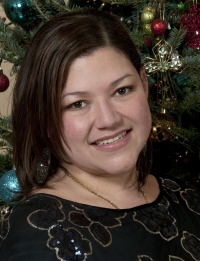
Premier’s daughter passes
 (CNS): Update Thursday 9:55pm – Messages of condolence have poured into the CNS comment board for the family of Tonya Yvonne Anglin, daughter of Premier McKeeva Bush and his wife, Kerry Bush, who died Tuesday morning. The messages have come from friends and family, including the Cayman Islands honorary consul to Barbados and local businesses and government entities. The governor, the deputy governor and the speaker of the LA have released public condolence messages, as have the chief minister of Montserrat, the acting premier of BVI and the secretary general of CARICOM. Tonya, who was just thirty years old, leaves husband Chet Anglin and daughter Zariah. She died at home and was pronounced dead at 8:30am Tuesday.
(CNS): Update Thursday 9:55pm – Messages of condolence have poured into the CNS comment board for the family of Tonya Yvonne Anglin, daughter of Premier McKeeva Bush and his wife, Kerry Bush, who died Tuesday morning. The messages have come from friends and family, including the Cayman Islands honorary consul to Barbados and local businesses and government entities. The governor, the deputy governor and the speaker of the LA have released public condolence messages, as have the chief minister of Montserrat, the acting premier of BVI and the secretary general of CARICOM. Tonya, who was just thirty years old, leaves husband Chet Anglin and daughter Zariah. She died at home and was pronounced dead at 8:30am Tuesday.
"The premier, Mrs Bush, and the family, appreciate the prayers and support of the country during their tragic, difficult loss," a statement from the deputy premier’s office said. "As they cope with this, they also appreciate the public’s understanding and consideration of their need to have an initial time of private mourning."
A statement from the Governor’s Office said Duncan Taylor and his family were deeply saddened to hear of the tragic passing away earlier today of the premier and Mrs Bush’s daughter Tonya and sent their sincere condolences to the Bush and Anglin families. "Their thoughts are with them during this sad and difficult time," the statement said.
Deputy Governor Donovan Ebanks also released a message to the bereaved families: "The public service is deeply saddened to have learned of the passing of the daughter of the Honourable Premier and Mrs Bush. On behalf of the whole public service, we wish to extend our deepest condolences to The Honourable Premier, Mrs Kerry and the rest of the family. We are all numbed by this shocking news. Death is the only certainty in life, but far too often it sneaks upon us when we least expect it.
"I believe that those of us who have been blessed with children will all agree that they redefine the real meaning of ‘love’ – regardless of what we thought that word to mean before they arrived. And while most of us are blessed to not have had the experience of losing a child, I also believe that it is truly the greatest loss that one can experience. I would urge us all to hold up this family in our prayers at this time, and pray that the good Lord will see them through these darkest days,” Ebanks said.
The Office of the Chief Minister of Montserrat, Reuben T Meade, sent the following message: “It is with an overwhelming feeling of sadness that I extend deepest sympathies to Premier the Hon. McKeeva Bush, OBE, JP, and his wife, Mrs Kerry Bush on the sudden passing of their daughter Tonya Eyvonne Anglin. We in Montserrat also share the grief of the husband and young daughter of Tonya and recognize that a loss at such a tender age as Tonya is unfathomable. On behalf of the Government and people of Montserrat please accept our condolences and be assured that you and your entire family will be in our prayers.”
Ambassador Lolita Applewhaite, Secretary-General of CARICOM sent these words to the bereaved family: “On behalf of the Caribbean Community (CARICOM), I wish to extend heartfelt condolences to you and to your family on the passing of your beloved daughter, Ms. Tonya Eyvonne Bush-Anglin.
The thoughts and prayers of the Caribbean Community are with you and your family during this difficult time. The loss of one so young and so vibrant in the Caymanian community creates a void that is difficult to fill, particularly to her husband Chet and daughter, Zariahr and to her parents and sibling. Once again, the Community conveys its deepest sympathies to the Anglin and Bush families. May her soul rest in peace.”
In a letter sent Thursday, Acting Premier of the British Virgin Islands Dancia Penn wrote: "It was with sadness that I learned of the sudden passing of your only daughter, Tonya. The Government and people of the Virgin Islands extend our sincerest condolences to you and your dear wife, Kerry, during what must be a most difficult period so early in this New Year."
The Acting Premier stated that the Premier Honourable Ralph T. O´Neal, OBE, is also "saddened to learn of this heartbreaking news". Honourable Penn asked Premier Bush to convey condolences to his daughter´s husband, Chet Aglin, young daughter, Zariah, and the rest of the family. She ended the letter by stating, "On behalf of the Government and the people of the Virgin Islands, please accept our sympathy and rest assured that we will keep you and the family in our prayers during this time of great loss."
Speaker of the House, Mary Lawrence, and members and staff of the Legislative Assembly said: "We mourn with you today the sudden loss of your beloved daughter Tonya. We pray that God’s peace and love will surround you and the beautiful memories you have of her, will bring comfort to your hearts.
We extend our sympathy too to her beautiful young daughter Zariah, her husband Chet, her brother Barry and his family, her grandmother Mrs. Faith Bush, and all the other family members and friends who were privileged to know this special young woman and share in her brief life. May God bless you all."
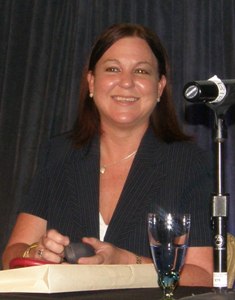
Rollover must be real break
 (CNS): One year on Sherri Bodden-Cowan found herself talking once again about the rollover gap on the discussion panel of the CBO conference on Thursday. Now chair of the Work Permit Board, the attorney and architect of the country’s seven year term limit for permit holders explained that any reduction in the gap had to still provide a meaningful time period that would constitute a legal break in stay. speaking to CNS after Thursday’s conference, Bodden-Cowan said that while legal opinion from London said that lawfully the Cayman Islands could reduce the rollover gap to as little as the government chooses, no lawyer could guarantee that a reduced gap would stand a courtroom test.
(CNS): One year on Sherri Bodden-Cowan found herself talking once again about the rollover gap on the discussion panel of the CBO conference on Thursday. Now chair of the Work Permit Board, the attorney and architect of the country’s seven year term limit for permit holders explained that any reduction in the gap had to still provide a meaningful time period that would constitute a legal break in stay. speaking to CNS after Thursday’s conference, Bodden-Cowan said that while legal opinion from London said that lawfully the Cayman Islands could reduce the rollover gap to as little as the government chooses, no lawyer could guarantee that a reduced gap would stand a courtroom test.
“We can change the current year break to one as short as we would like but the problem we would face if we reduced the gap to a mere 30 days would be that such a short period could not be considered as a legal break in stay and nothing more than a holiday,” Bodden-Cowan said.
She explained that by reducing the rollover break too much, the country could see the issue that the policy was designed to prevent coming to fruition in several years. Without a real break individuals could realistically remain living and working in the Cayman Islands for as much as fourteen years with only a month’s break. The WP board chair pointed out that it was extremely likely that the courts would find in favour of someone in those circumstances being given permanent residency rights, and that could very easily become a lot of people.
“We have seen examples of nine month breaks that appear to stand the legal test and it may be possible to reduce the break to six months, but that may turn out to be too short when tested in the courts,” she added.
With the advent of the bill of rights, Bodden-Cowan said it was not possible to return to the days when people remained in Cayman for years and years without any security of tenure, and the country could not afford to offer permanent residency and the opportunity to become Caymanian to everyone who would want it.
Despite the continued controversy regarding the policy, Bodden-Cowan re-emphasized her belief that it remains the best way to manage the continuing problem that Cayman faces of balancing the issue of immigration control with the needs of the business community.
“The key employee system is there to ensure those that are needed have a way to stay and can move through the system to become Caymanians,” she said, adding that this was how Cayman could gradually grow the population with the talented people that the economy needs.
Speaking during the panel discussion, she said the policy was no means contrary to growing the economy and the system was the best way to create new Caymanians.
She warned that abolishing the rollover because of its percieved inconveniences would be handing a troublesome legacy to future generations, who would then have to deal with the high numbers of people who would have the right to be Caymanian and therefore make claims on thestate for education, healthcare and support in their old age.
Theo Bullmore, who was also on the panel, described the rollover as a little hobbyhorse of his and he said he has always believed the system was wrong. “I think it’s morally wrong to treat people as disposable," he said, adding that it hurt Cayman businesses, was costly and illogical. Bullman said he believed that it had institutionalised the old Caymainian saying of “I’m here to stay – you here to go” and had created the current divide.

Early morning shooting in GT
(CNS): Police say a 19-year-old man was shot in the neck around 2:10 am this morning, Sunday 23 January and is currently undergoing treatment for the wound at the Cayman Islands Hospital, George Town. The shooting occurred at a residence located along Cruz Lane in George Town, according to the RCIPS. The wound is serious but not life threatening, and the victim is expected to recover in time. The motive of the shooting is unknown at this time, and police are appealing for anyone who was in the vicinity of the incident at the time it occurred or who may know of something in relation to what transpired to contact the George Town police station at 949 4222, or call Crime Stoppers 800 8477(TIPS).
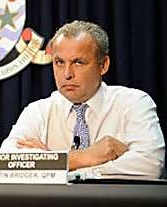
Bridger’s complaints rejected
 (CNS): Complaints made to the Foreign and Commonwealth Office (FCO) by Martin Bridger, the former lead investigator of Operation Tempura, the undercover police investigation into the RCIPS that took place in the Cayman Islands between 2007 and 2009, have been dismissed by the governor. Although still considering some of the complaints, Duncan Taylor, who took up the post of governor after the investigation was discredited, said the allegations Bridger had made about Chief Justice Anthony Smellie, Justice Henderson and Justice Cresswell were “without justification” and that he had every confidence in the local judiciary.
(CNS): Complaints made to the Foreign and Commonwealth Office (FCO) by Martin Bridger, the former lead investigator of Operation Tempura, the undercover police investigation into the RCIPS that took place in the Cayman Islands between 2007 and 2009, have been dismissed by the governor. Although still considering some of the complaints, Duncan Taylor, who took up the post of governor after the investigation was discredited, said the allegations Bridger had made about Chief Justice Anthony Smellie, Justice Henderson and Justice Cresswell were “without justification” and that he had every confidence in the local judiciary.
The complaints were made in the first instance to the FCO last summer by the legal advisor to Tempura and the special police investigation team, former attorney Martin Polaine. The complaints were referred to him for consideration, Taylor said on Friday afternoon. He explained that Bridger later asked to be considered a joint complainant, and when Polaine withdrew his complaint, Bridger took full ownership.
“I was not the governor during the period of Operation Tempura and did not have first-hand knowledge of events which had transpired during those years. Due to the factual and legal complexity of the complaint and the large amount of documents which had to be considered, in late August 2010 I instructed independent Queen’s Counsel from London to advise me on how to proceed,” the governor said.
“I have now received detailed legal advice in respect of the complaint. I am still considering some aspects of that advice but I have reached a conclusion in regard to the complaint as it touches on the judiciary. I have dismissed all the complaints made against the judiciary, namely those complaints made against the Chief Justice, Mr Justice Henderson and Mr Justice Cresswell.”
Taylor said the complaints were similar to those revealed in an article in the Financial Times 13 January.
“I consider that any allegations raised against the judiciary of the Cayman Islands in that article inferring that they had conspired to frustrate or interfere with Operation Tempura are unfounded and without justification,” Taylor stated, adding that he would make a further statement once he had considered all aspects of the complaint.
“I would like to take this opportunity to make clear that I have every confidence in the judiciary of the Cayman Islands.”
Bridger now appears to be working with the company owned by Polaine, who was removed from the legal profession by the UK Bar Council last year as a result of his work with Operation Tempura. The former head of the investigation has suggested that Tempura was not stopped because it was discredited, despite the unlawful arrest of justice Henderson, but because he was prevented from further investigations in Cayman
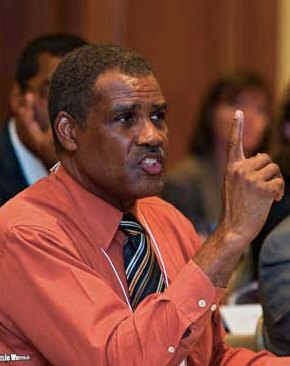
Free healthcare for CS no longer an option
 (CNS): A clear message was sent out at a conference geared at turning around Cayman’s healthcare system, with high level officials calling for a change in the way civil servants, who currently receive all their healthcare premium costs paid for by government, receive their healthcare benefits. Canover Watson, Chairman of the Health Services Authority, called for the “entitlement behaviour” of civil servants to end. “This entitlement culture has to be addressed. Until there is shared participation in healthcare there is no incentive to change,” Watson said. (Left: James Watler – Photo by Dennie Warren Jr)
(CNS): A clear message was sent out at a conference geared at turning around Cayman’s healthcare system, with high level officials calling for a change in the way civil servants, who currently receive all their healthcare premium costs paid for by government, receive their healthcare benefits. Canover Watson, Chairman of the Health Services Authority, called for the “entitlement behaviour” of civil servants to end. “This entitlement culture has to be addressed. Until there is shared participation in healthcare there is no incentive to change,” Watson said. (Left: James Watler – Photo by Dennie Warren Jr)
The HSA chair was speaking at the Cayman Islands Healthcare Thought Leaders Forum held at The Ritz-Carlton, where the controversial issue was raised. Watson said a sacrifice for the greater good was needed. “The civil service is a large voting block for government, so it will take political risk to make the change … Whatever plans we implement, however they are structured, there needs to be change,” he added.
The health minister also said that, given the country’s growing and aging civil service, the unlimited medical plan for civil servants could not continue. “I don’t know of any other organisation in the world that pays 100 per cent medical coverage. It is unsustainable,” he said. “We have no tax base and our revenue is declining … We need all the different groups on board to address the issue.”
However, James Watler, President of the Cayman Islands Civil Service Association, (above) vociferously defended the civil service and said that his association had tried many times “to conduct dialogue with the government in this respect."
Lizzette Yearwood, the Health Services Authority’s CEO, said the HSA wanted to keep that dialogue going as she believes that the momentum for change had already begun and that Cayman could not continue where it was. She pointed out the recent steps to change the health insurance legislation to ensure that more people were effectively covered and the evolvement of CayHealth, the initiative designed to take the pressure off emergency and acute care services using preventative healthcare measures and providing primary healthcare.
Kenneth L. Di Bella, President & CEO of CBCA Administrators, Inc, which works with the Cayman Islands National Insurance Co (CINICO), organised the event in a bid to address the issue of Cayman taking responsibility for directly contracting health care providers instead of using a third party or “middleman” at great expense.
Di Bella also presented the idea of introducing wellness and disease management programmes into Cayman in a bid to encourage people to take responsibility for their health and stem the rise in chronic conditions and thus reduce healthcare costs.
After it was pointed out that there was no reason to try and incentivise individuals to look after their health when they already received 100% free health insurance coverage, Di Bella said that the system would have to look internally to see whether it could continue.
“I suggest a system that gives free healthcare cannot continue,” he said. “But you need the political will to make the change.”
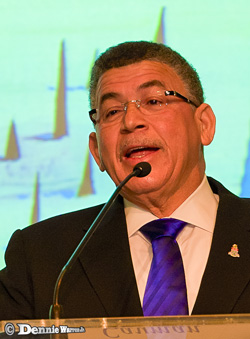
Chinese to build North Sound channel
 (CNS): The idea of a channel in the North Sound to facilitate mega yachts is back on government’s agenda following the premier’s announcement on Thursday that there is interest from a group of Chinese developers to construct it. McKeeva Bush made a number of announcements about potential development projects, including a pier at the Turtle Farm, a dock in Cayman Brac, new roads in the eastern districts, enhancements at the airport and the channel, which the group of Asian investors may be involved with. Bush said the channel was “absolutely necessary” and would allow the large vessels to dock in Cayman. (Photo Dennie Warren Jr)
(CNS): The idea of a channel in the North Sound to facilitate mega yachts is back on government’s agenda following the premier’s announcement on Thursday that there is interest from a group of Chinese developers to construct it. McKeeva Bush made a number of announcements about potential development projects, including a pier at the Turtle Farm, a dock in Cayman Brac, new roads in the eastern districts, enhancements at the airport and the channel, which the group of Asian investors may be involved with. Bush said the channel was “absolutely necessary” and would allow the large vessels to dock in Cayman. (Photo Dennie Warren Jr)
Speaking at the CBO conference at the Ritz-Carlton on his birthday, the premier explained that the motivation for the channel was the growth in mega and super yacht registration and in particular with Cayman’s own maritime authority.
“At the end of 2010, the Maritime Authority of the Cayman Islands had 1,870 vessels on their George Town Registry – a 3% increase from last year. Notably in this economic climate, it was the second best year ever in terms of new units registered,” Bush revealed in a presentation full of announcements. “We are also a world leader in super-yacht registration, with 85% of vessels registered as pleasure vessels and 15% as commercial ships.”
He said he was optimistic that, based on the 2010 figures, the next few years would continue to be as successful and Cayman needed to provide the facilities for the yachts to come to the islands, in turn offering new local opportunities. “I believe that the new North Sound channel will not only provide the potential for recreation, habitat preservation and development, but also offer integration opportunities for local hotels and residents. Rest assured, these projects will provide numerous benefits to residents and visitors alike.”
Bush asked the audience why he should not build the channel as the Sound was already suffering because it had become so shallow the water was no longer as clear as it once was. Warning the “naysayers” to come up with better ideas, he said, “If you are going to object tell me what you would do.”
The North Sound, he said, was an asset that the country should use but his government was not seeking to impact the entire area.
“We are simply turning our thoughts to the smallest but most practical channel being developed within the North Sound – leaving the vast remainder of the Sound untouched,” the premier stressed. “Thus far, we have had major investment interest from a Chinese company, which we are currently exploring, to provide the necessary infrastructure to take full advantage of the channel from an economic perspective while mitigating any potential adverse impacts on the environment.”
Although he did not name the Chinese company with which the government has been discussing potential projects, he said the development of a pier and related facilities near to the Cayman Turtle Farm in West Bay; development of a cruise pier and related facilities in Cayman Brac; major road works in the eastern districts of Grand Cayman; and enhancements to the airports both in Grand Cayman and Cayman Brac.
“I have high expectations that we will sign a memorandum of understanding in the near future in order to commence definitive work on these projects,” the premier added.
He also said that if the issues surrounding the cruise berthing facilities in George Town continued to cause problems, the Chinese stood ready to build those facilities as well. Bush lamented the fact that government has been in talks with various people over the cruise facilities but the government has still not got anywhere and he had run out of excuses as to why the project was not underway.
“I am not prepared to wait any longer. If this particular company wants to develop it, I am prepared to go with them.”
Berating the bureaucracy in general, he made pointed remarks to the governor, who was present in the audience, about stumbling blocks and having to do things in certain ways because the country was a democracy.
“If I was still chairing my boards it would have been done by now, but people would say I was up to my old tricks” he said to the audience, adding that people call him a dictator and he wasn’t a dictator but he wished sometimes he was.
He pointed to a pressing need to improve the airport, especially with the increase of private jet arrivals. “We need new facilities at the airport if we are going to improve our position and want wealth to rise above poverty. We need people with private jets to come here, even if they do offer me a lift,” he said to wide amusement from the audience as he referred to his own return on a private jet on New Year’s Eve.